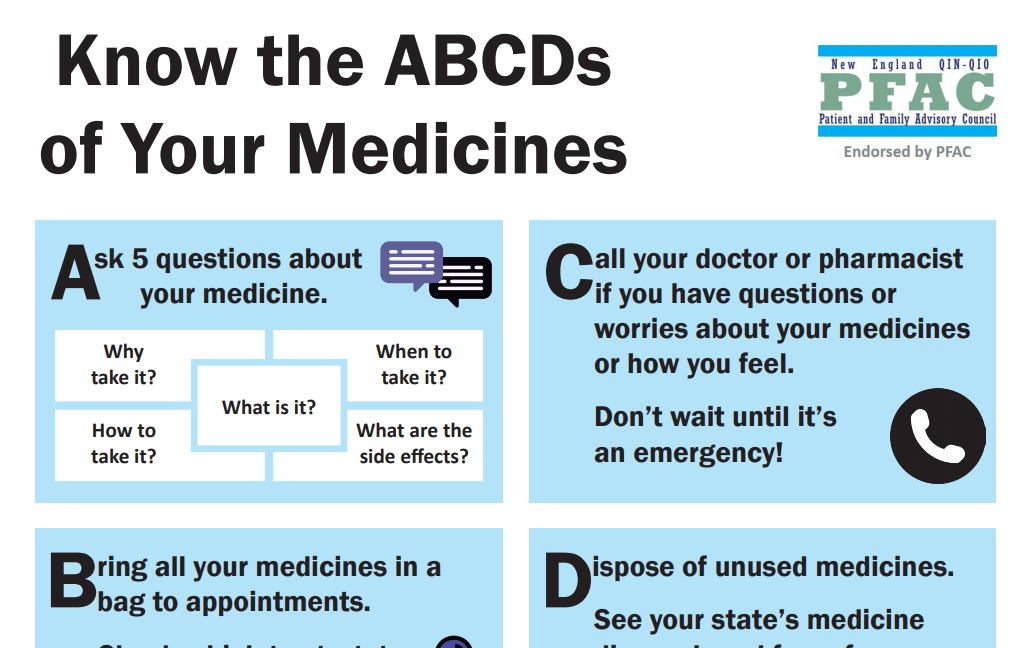Sample fillable flyer for NH’s to advertise vaccination clinic.
Category: Resource
Diabetes Management: Directory of Provider Resources
The Provider Directory is designed to facilitate diabetes treatment for primary care teams, particularly providers working with Medicare beneficiaries and vulnerable populations who experience a higher prevalence of type 2 diabetes and its complications.
CMS Nursing Home Adverse Drug Event Trigger Tool
This tool was developed by CMS for use by nursing home surveyors and is a valuable resource for organizations that are focusing on preventing ADEs.
It was designed to help surveyors identify:
1. The extent to which facilities have identified resident-specific risk factors for adverse drug events
2. The extent to which facilities developed and implemented systems and processes to minimize risks associated with medications that are known to be high-risk and problem-prone
3. When a preventable adverse event has occurred, evaluate if the nursing home identified the issue and responded appropriately to mitigate harm to the individual and prevent recurrence.
Know the ABCDs of Your Medicines
Patient handout, primarily for transitions of care.

Diabetes Management Essential Communication Elements Guide For Transitions of Care Guide
This is designed for use in any facility by staff or a healthcare provider. Improvement of cross-setting management of diabetes medications during transitions of care to prevent adverse drug events and subsequently reduce emergency department visits, hospitalizations, and readmissions.
Anticoagulant Essential Communication Elements Guide
This is designed for use in any facility by staff or a healthcare provider. Improvement of cross-setting management of anticoagulants during transitions of care to prevent adverse drug events and subsequently reduce emergency department visits, hospitalizations, and readmissions.
Blood Thinner Safety Plan
This is designed for patients. It helps patients determine if they are ok with their anticoagulant treatment, should contact their doctor or go to the ED.
Diabetes Adverse Drug Event (ADE)
This is designed for nursing home staff, and other facilities could use it as well. It has information about ADEs including: definition, facts, common ADEs, and occurrences that could point to an ADE.
Anticoagulant Adverse Drug Event (ADE)
This is designed for use by nursing home staff, and could be used on other settings. It has information for identification of ADEs including: ADE definition, quick facts, common ADEs, and occurrences that could point to an ADE.
Adverse Drug Events (ADEs)
This is suitable for Nursing Homes, and could be used for other settings. It is intended to educate staff on adverse drug events (ADEs) including definition, identification, common ADEs, causes of ADEs, and generalized facts about ADEs.
MDS 3.0 RAI Manual
This website contains the MDS 3.0 RAI Manual v1.17.1 and MDS forms, effective October 1, 2019. This version of the MDS 3.0 RAI Manual incorporates clarifications to existing coding and transmission policy; it also addresses clarifications and scenarios concerning complex areas. Since the preliminary release of the manual on May 20, 2019, changes have been made to clarify which assessments swing bed providers must complete; the definition of the “interruption window” for interrupted Part A-covered stays; the coding of item I0200B; and changes related to group therapy policies, as well as other corrections. Please see the document titled “MDS 3.0 RAI Manual v1.17.1 Replacement Manual Pages and Change Tables_October 2019” posted in the Related Links section at the bottom of this page.
Communicating With and About People with Disabilities
General tips to follow to communicate appropriately and respectfully with and/or about an individual with a disability.
Avoiding Ableist Language
Disability metaphors abound in our culture, and they exist almost entirely as pejoratives. This handout serves as a reference for linguistic microaggressions and everyday, casual ableism.
Disability Language Style Guide
This style guide, developed by the National Center on Disability and Journalism, covers almost 200 words and terms commonly used when referring to disability.